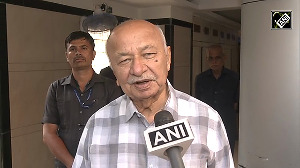Global majors such as Comcast and Liberty Global have refrained from making investments in the Indian cable industry, given the lack of last-mile control. Similarly, poor profitability, poor growth potential and corporate governance issues amongst news broadcasters have deterred foreign investments.
 Just before Diwali, the government announced an increase of foreign direct investment (FDI) limits in the media among 15 other sectors.
Just before Diwali, the government announced an increase of foreign direct investment (FDI) limits in the media among 15 other sectors.
Last week, the Department of Industrial Policy and Promotion notified the new rules.
Thus, 100 per cent FDI is now allowed in almost every major TV distribution form (direct-to-home, cable, headend-in-the-sky, multi-system operators) and 49 per cent in TV news.
Even radio got a little prize with a raise in the FDI ceiling.
The reaction so far? "The development is positive on paper but largely a non-event from the practical perspective," says one media analyst.
He points out that "the limits prior to these changes remain under-utilised due to structural issues resulting in low foreign investor interest, so raising FDI limits may not attract more investments."
According to him, global majors such as Comcast and Liberty Global have refrained from making investments in the Indian cable industry, given the lack of last-mile control. "Similarly, poor profitability, poor growth potential and corporate governance issues amongst news broadcasters have deterred foreign investments."
"It is by and large about valuations, it won't change the dynamics of the business," says Tony D' Silva, CEO of the media business at Hinduja Group.
For cable companies such as Hathway or Den or any other company into TV distribution, it brings the option of more liquidity through more dilution, if needed.
So "it is a welcome move but we do need more clarity, stability and an objective licensing regime. It is one thing to increase investment. But it would be nice if there is more work on ease of doing business," says Sudhanshu Vats, group CEO, Viacom18 Media.
That is a point that almost everyone mentions.
The stories around the procedural mess of launching a channel or getting approvals to be on a satellite are dime a dozen.
From four to six months during Ambika Soni's tenure as the information and broadcasting minister (2009-2012), getting a licence for a channel can now take between eight months and three years, says one broadcaster.
For example, in 2012, Star's Vijay TV applied for a licence to launch a second channel; it finally got one this year.
About one-and-a-half years ago, National Geographic shifted from Hong Kong to India and applied for a licence to uplink from India.
The idea was to take advantage of a liberal uplinking policy and also increase its India programming. It finally got the licence in September.
The good parts of the FDI changes? Many of the sectors now have higher amounts coming through the automatic route rather than through the Foreign Investment Promotion Board, or FIPB. That should hurry things up a bit.
But there is still the issue of the permissions through several ministries including home and the Department of Telecommunications.
The second happy fallout is that forming limited liability partnerships becomes easier. "Earlier, this needed approval. Now one can do a limited partnership for short term projects such as a film.
For example, if Fox wants to do an LLP to co-produce a film it can now do it without approvals (from FIPB) or without setting up a joint venture," says Sachin Shah, partner, EY.
Bibhu Prasad Rath, president and CEO of Odisha-based Ortel Communications, a regional cable company, points to a third positive.
"The requirement for building and owning large-scale last-mile network is much more capital intensive than pure digitisation of the networks. Hence, enhanced FDI Limits will help the industry as more and more players start building last mile network on a larger scale," says he.










 © 2025
© 2025